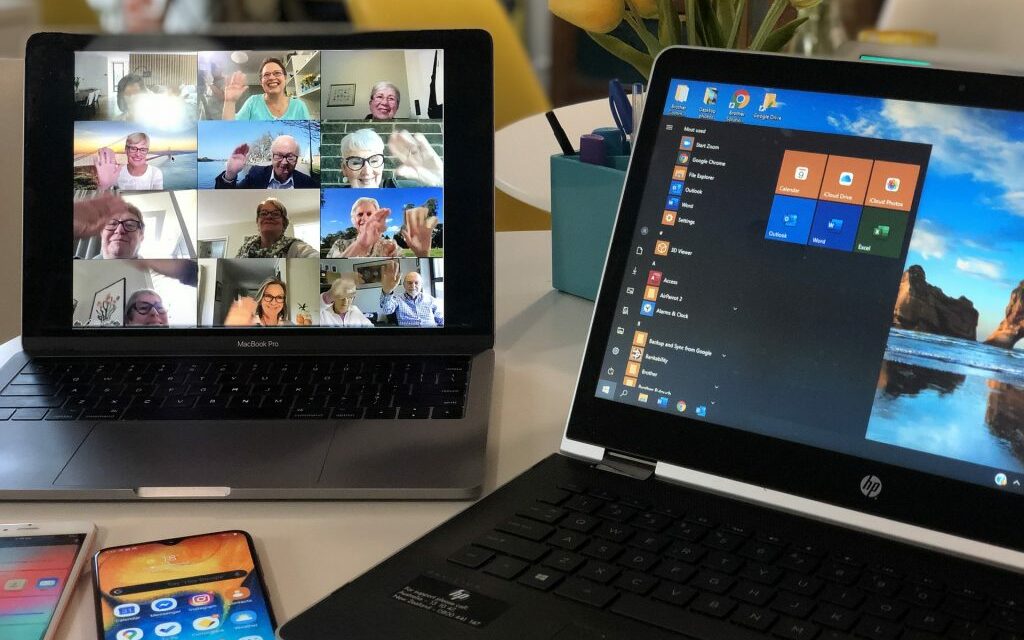Online course development is an altogether trickier task than maintaining a blog or running a bit of social media. These latter activities you could — theoretically at least — handle using little more than an old laptop, a style guide, and an industrial-sized pot of Nescafe Instant coffee.
Online courses require more than that. Sure, the act of teaching is intellectually more demanding than stating your opinion in a blog or sharing entertaining pictures of your pet gerbil on social media. But online courses are also more technically demanding. The long and the short of it is that building a good webinar requires robust equipment.

Let’s take a quick look at some of the kit you’ll need, and how to discern which stuff is worthy of your investment.
Webinar software
There are many different kinds of webinar software out there, and perhaps surprisingly, they differ a great deal. If you spend hours and hours researching anything on this list, focus your attention on your webinar software. The best webinar platforms for you won’t necessarily be the most expensive. Instead, they’ll be those platforms that best suit your unique presentation approach and style.
For example, some webinar software emphasizes ease of use for the presenter. Others focus more on creating an easy and accessible portal for your audience. Some platforms are designed expressly for co-presenting webcasts, while others will double down on supporting your content with Q&A modules, polls, or course description templates.
Know exactly what you want and hunt for that. Ignore fancy features you won’t use.
Before you commit to one platform, spend some time taking advantage of webinar free trials. These offer a valuable opportunity to gather information about what features will work best for you and why.
A pro tip
Headset
There are three main components to the perfect webinar headset.
First, of course, you have sound quality. Gaming headsets tend to use poor and “tinny-sounding” microphones. They’ll drain the depth from your voice and generally cheapen your production quality. Seek out a headset with a higher quality microphone. Bear in mind also that the less controlled your acoustic environment, the more important it is to work with a mic that can overcome these obstacles.
Second, you’ll need a headset you can mute silently. Ideally, this should be done via software, but failing that, opt for a silent physical switch that turns your audio channel on and off without that annoying click.
Finally, ergonomics is important. How does this headset feel on your head? Can you get the mic to an ideal recording position? Constantly fiddling with your headset isn’t a good look on camera, and it adds a lot of noise to your recording too, so find a headset you can set and forget.

Lighting
Lighting will transform a video webinar from footage resembling a Zoom call to something at least approximating professional studio conditions. Again, you’ll want to focus a solid chunk of your equipment investment here, though it’s worth noting that top-of-the-line lighting equipment is probably overkilling.
You have a few options to consider.
A softbox is just a high-quality light bulb surrounded by a translucent, light-softening filter. These are generally the most affordable options. They’re not especially durable or versatile, but they’ll instantly fill in your face, banish annoying shadows, and lift the appearance of your footage.
At the other end of the mid-range spectrum, you have LED lighting options. There is an abundance of products to choose from here, but you’ll save money if you focus on plug-in options. Most setups won’t require a huge LED array either, so you can save some moolah there as well.
Webcam
Most laptops include a fairly decent webcam, so while you’ll eventually want a dedicated camera, you could probably push this purchase back a little if you’re on a limited budget. Eventually, however, a separate webcam offers a few distinct advantages over a regular laptop webcam.
You can easily position them at your eye line, a dedicated webcam is easier to configure, and they’ll be able to deliver high-quality video in excess of 1080p at a good frame rate. The result? Less flicker, and a more professional look.
There are a few additional features you might want to look for if you can stretch your budget. The first is support for a virtual background via a green screen. Set up well, this can greatly improve the look of your webinar. Another feature to look for is decent zoom functionality. This gives you more control over where you frame your shot, which is ideal if you are recording from home.

Discover the mind behind the innovations – Elon Musk by Walter Isaacson, now on Audible. Dive into the life of a visionary shaping our future!
View on Amazon
Webinars require some equipment investment to get them looking good. However, if you can concentrate your budget on a good webinar platform backed up by a solid headset, lighting, and webcam, you’ll be well-positioned to deliver professional content and build a strong following.




